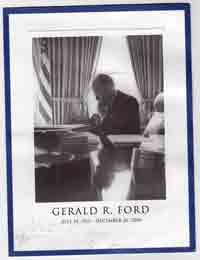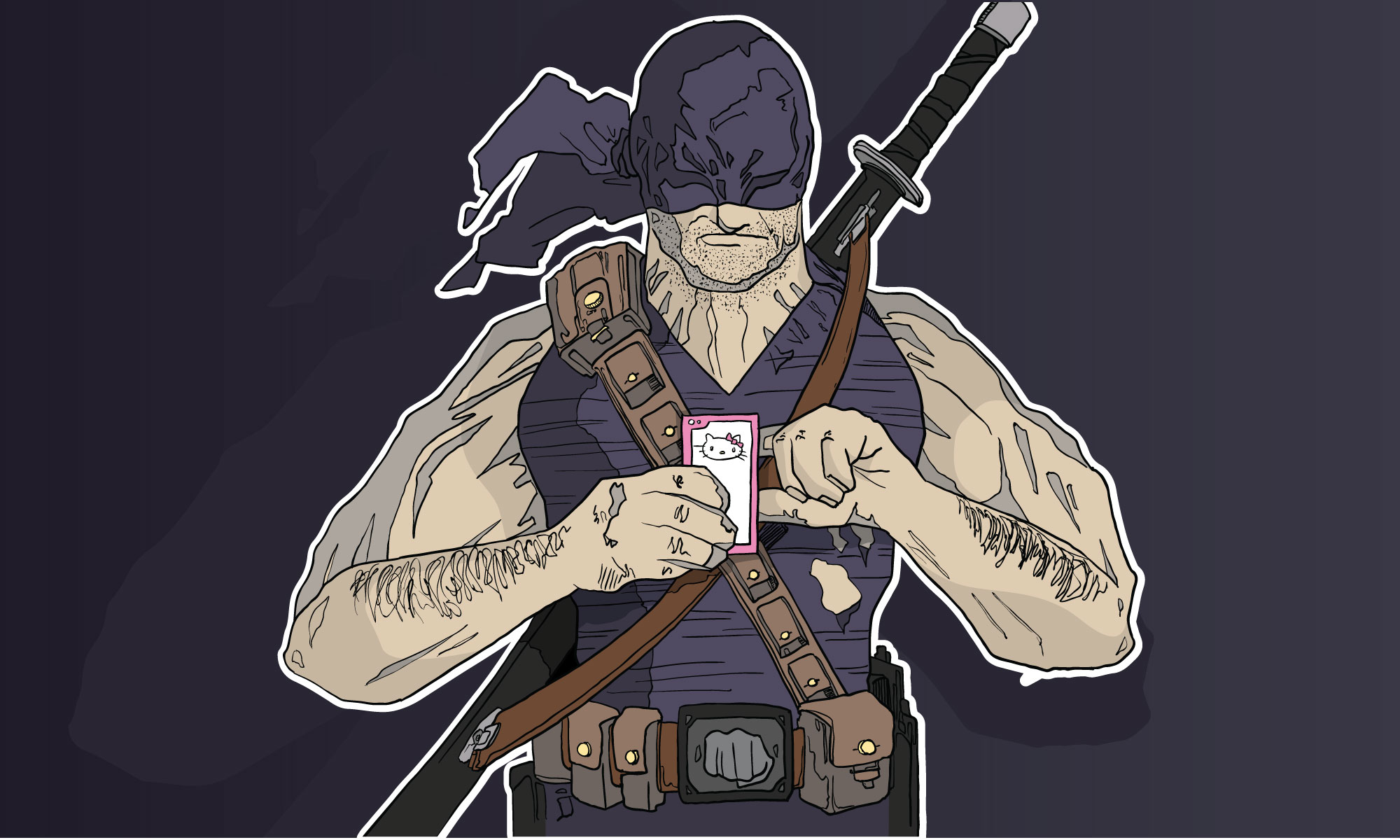The end-of-the-year newsmagazines invariably contain pages of photos of notable people who have died in the previous 12 months. And following that, every holiday break seems to have its share of famous and infamous deaths that casual observers either miss or notice by accident because of the busyness of the season. One of those deaths was very hard to get away from this year, especially in Michigan: The passing of Gerald Ford.
Because Jerry was from my wife’s hometown of Grand Rapids, every newspaper we picked up during Christmas week had lionizing articles about his wisdom, his statesmanship, his decency. (As Jack Schaefer pointed out in Slate, it’s a regional cliché to refer to someone from the Midwest as “decent” in their obituary. Just as someone from New England would be called “flinty”, Californians would be “laid back” and Texans “A bit of a maverick, with a heart as big as all outdoors.” The whole thing feels like a backhanded compliment sometimes, as if people in the Midwest are too stupid to be anything but hard-working and decent.) It was great fun to tease my wife every time the commentators mentioned the “small town” where Ford grew up and learned all his Midwestern values. (Grand Rapids has about 200,000 people.) But this “small town values” script is part of the national character. Our leaders must rise from humble beginnings to greatness, and always make it look like a reluctant journey. Every leader cast as Cincinnatus. The last presidents I can recall from large population centers are JFK and FDR. Don’t call Grand Rapids a small town, pal–they’ve got a symphony, an opera company AND an arena football team.
 Towards the end of vacation, we decided to take the chill’uns up to Grand Rapids and possibly stand in line to pay our respects. It meant skipping a day of school, but everyone said that this was a part of history, something that the kids will never forget. And anyway, it might be the last funeral for a president in the Great Lakes until Obama cashes out sometime around 2050.
Towards the end of vacation, we decided to take the chill’uns up to Grand Rapids and possibly stand in line to pay our respects. It meant skipping a day of school, but everyone said that this was a part of history, something that the kids will never forget. And anyway, it might be the last funeral for a president in the Great Lakes until Obama cashes out sometime around 2050.
The casket was placed in the Gerald Ford Presidential Museum, which is right downtown on the Grand River. (Ford didn’t feel the need, apparently, to construct a monument to his greatness in the form of a library/conference center, and instead left his papers to the University of Michigan.) The viewing was from 5 pm til 11 am, so we watched the news to see how long a wait it was to stand in line. For most of the evening, it was an 8 hour wait, so we decided to nap and regroup closer to midnight. At that time, one talking head said it was still an eight hour wait, then it was corrected to a four- to six-hour wait. We went downtown to see for ourselves. The kids were less than thrilled, but we piled them in the car anyway.
The line on Monroe Avenue was only 50 yards long, much shorter than the map shown on TV, so we all decided to get out and give it a shot. Two hours would certainly be a manageable amount of wait to salute the man. And we still felt that way as we wound our way into the convention center. And wound and wound and wound our way through the concrete cavern. To let visitors stay warm while in line, the convention center was roped up in a maze of switchbacks. A little math showed us it would take close to 3 hours to make it all the way through. But there we were, and a lot of other people too. My in-laws are nothing if not adventurous, so we all stuck it out. Back and forth in the switchbacks, getting to know everyone we passed time and again, by sight if not by quick conversation. (One of the talking heads had commented in wonder how everyone in line was good natured and calm about the wait, not angry or impatient. What did he expect, fistfights and gang rapes? At least he didn’t call us all “decent”.)
We entered the convention center at 1 am, and stepped outside again at 3:45. The kids had taken catnaps on the perimeter of the convention hall, but were still in a daze. Time seemed to both drift away and not move at all. It was almost exclusively a white crowd, although one black man wore a warm up suit from Ford’s high school alma mater, a nice neighborhood salute. There were a lot of young people in the crowd too, lots of college kids from the area. They behaved, by and large–maybe this was an excuse to get out of their parents’ houses for a while before they moved back to the dorm—though I’ll never get used to people who wear flannel pajama bottoms in public or wrap themselves in fleece blankets like burritos from Wal-Mart. Although there were some visitors from out of state–we talked to one person who drove up from Kentucky—most of the crowd was turning out for the hometown boy. They wore UofM jackets, and buttons with Jerry Ford’s picture on them.
For some time I tried to make some sense of the scene, trying to understand what Ford meant to the country, aside from a certain nostalgia for an era of wide ties and polyester suits and Andy Warhol hanging out with Jack Ford. In addition to all the hagiography in the GR Press, I had read Christopher Hitchen’s article in Slate that pointed out some of Ford’s lesser moments, such as the sellout of East Timor to Indonesia’s Suharto, the bungling of the Mayaguez incident, and a few other foreign policy snafus. (Hitchens never fails to pee in the punchbowl. How’d you like that blowhard to give the toast at your wedding? “You may think this fine young couple have a fine future ahead of them, but let’s not forget the wife’s bipolar disorder and the husband’s inability to keep his thing in his pants….”) I didn’t want to dismiss Hitchens’ reminder that Ford was less than a stellar president, but really couldn’t work up much of a lather. Considering the state of the world and the surreptitious foreign policies he inherited, it may be notable that he didn’t botch many things already in motion. While that may sound like faint praise, it’s not meant to be. After a few hours walking back and forth in the convention center, I wasn’t thinking much of anything except how much my eyes burned.
At 3:45 am, we exited the center, passing large oil paintings of Ford on display in front of a large condolence book. Even though I was sure Betty would read every single message, my wife didn’t feel it was worth the extra time in line. We stepped outside and waited another 30 minutes alongside the river to cross the bridge to the museum. All I can say is, for 4 am on January 3, it could’ve been a lot colder. As it was, it was nasty enough. On the bridge, film crews had begun taping off their assigned workspaces, 10 by 25 feet, for their morning reports on how decent we all were, and Jerry Ford most of all. On the bridge to the south of us were about 30 satellite trucks pointed towards the heavens and ready to sing.
Our destination came into sight. I was only praying we would get inside before dawn, because the sight of morning would really make me feel the fatigue. We filed into the Ford Presidential Museum and passed the graffitied chunk of the Berlin Wall like ones in leaders’ museums all over the world (now THAT’S a concession that looks like it was pretty easy and profitable). I took my hat off, like fully 40% of the people did upon entering (How were most of these bozos raised, anyway?). And at almost the exact pace we’d kept up for 3 hours, we all filed past the flag-wrapped casket.
As we exited, some ladies from the museum passed out cards to us and thanked us for paying our respects. (That’s the card above.) On the back it mentioned his degrees and years of public service, and mentioned that we were celebrating “the life of a loving and devoted husband, father, grandfather, and great-grandfather, and the 38th president of the United States”. We found out later that the cards were paid for by the Ford family. A nice touch.
And the first thing we found to talk about once we got outside again, was how COMPLETELY AND ABSOLUTELY STILL his honor guard was standing. Four servicemen stood at each corner of the coffin, looking like they had been encased in lucite. It was the most amazing thing we’d seen all evening. Then, while my father-in-law retrieved the car, the five of us walked under the highway to the Big Boy, open late that night for the special occasion, and drank hot chocolate.
We did manage to get home before dawn broke, and everyone got in about 5 or 6 hours of sleep. For the next couple days, I felt like I had jet lag, which only underscores how rarely I stay out all night.
So there it is, our exercise in civic duty for the day. I don’t want to describe it as “obligatory” because it wasn’t. I’m a proud part of this democracy, as is the whole family, and I’m glad I didn’t pass up the chance to see it in one of its more dignified ceremonial moments. (And kudos to Ford for simplifying his funeral requirements, and having Tom Brokaw speak a eulogy. And having the band play “Hail to the Victors” at the airport.)
All the lionizing of Ford’s record is predictable, of course, and the right thing to do. A lot of it was over the top, and the comments by the local reporters was so inane it bordered on delusion. He didn’t “save” the country, he didn’t put all our hearts at ease with his steady decency. He didn’t lose the presidency because he pardoned Nixon, but because of a whole nest of factors, including his comment during the presidential debate with Carter that Eastern Europe wasn’t under the domination of Russia. The image of Ford as a bungler had been brewing for some time, and comments like that made him seem not up to the task. But you don’t get as far as Jerry Ford got by being a dolt. Perhaps because he lacked the Machiavellian streak of his predecessor, he didn’t elicit enough respect from people. We were lucky at the time to have a president who knew enough about the world that he didn’t feel obliged to prove it all the time. I’d say a good definition of “decent” would be the “opposite of ruthless”. With all the power-hungry SOBs who inhabit every office and cubicle in Washington, we were lucky to have someone in office who had a clear and accurate vision of his role in the republic. Haven’t seen that in a while, you must admit. If that’s what decency is, I’ll take it.

